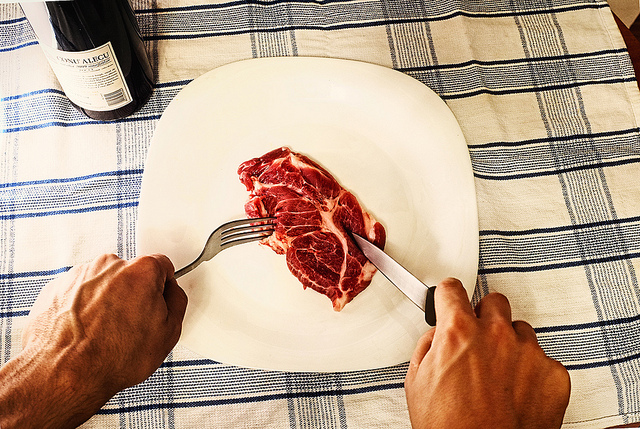http://e-info.org.tw/node/114979
減碳開徵「紅肉稅」 丹麥智庫14比3通過提議
文字大小
181 1 Share2
本報2016年4月29日綜合外電報導,姜唯編譯;蔡麗伶審校
主張「氣候變遷是倫理問題」,丹麥政府智庫倫理委員會(Danish Council of Ethics)提議對牛肉課稅,未來還將延伸至所有的紅肉。這項提議獲17位委員中的14位贊成,現在正交由政府考慮是否實施。
丹麥正在考慮對豬肉、羊肉、牛肉等紅肉課稅。圖片來源:Marius Boatca(CC BY-SA 2.0)。
委員會表示,長期而言,這個規範應該要適用於所有食物,依照不同食物對氣候變遷的影響課稅。目前則建議對牛肉課稅,因為牛肉是「對地球最具毀滅性」的食物。
倫理委員會在新聞稿中指出,丹麥受到氣候變遷的直接威脅,而依賴「有公德心的消費者」並不足以讓丹麥達成聯合國承諾。
「丹麥的生活方式距離氣候永續還差得很遠,要達成巴黎協議保持全球升溫2°C以內的目標,有必要儘快採取行動,並且從食物下手。」委員會表示,光是畜牧牛就佔了全球溫室氣體排放的10%,而整個糧食生產相關產業的佔比為19%至29%。
委員會認為,丹麥人在倫理上有義務改變飲食習慣,而且就算不吃牛肉,一樣能享受健康營養的飲食。
委員會發言人耶爾麗斯(Mickey Gjerris)說:「要從飲食上有效因應氣候變遷,同時喚起人們對氣候變遷的問題意識,所有人必須共同承擔這個責任,透過立法規範傳遞清楚的訊息。」
不過委員會的意見也馬上引起丹麥農業與糧食委員會的反彈。發言人Niels Peter Nørring表示:「氣候稅需要公部門和食品業投入大量資源設置,但效果將會很有限。」Nørring認為,氣候變遷只能從全球層級解決。
丹麥執政黨發言人丹尼爾森(Thomas Danielsen)也表示,政府不太可能實施這個措施,認為效果有限,更將其形容成「官僚創造出的怪物」。「這有可能減少丹麥的牛肉消費量,但對於全球的二氧化碳排放量沒有幫助。」丹尼爾森說。
編註:紅肉是營養學上的名詞,指的是在烹飪前呈現岀紅色的肉,具體來說豬肉、牛肉、羊肉、鹿肉、兔肉等等所有哺乳動物的肉都是紅肉。(來源:維基百科)
【相關文章】
【參考資料】
- 英國獨立報(2016年4月27日),Denmark ethics council calls for tax on red meat to fight 'ethical problem' of climate change
- The Local(2016年4月25日),Could Danes face a 'red meat tax' to help climate?
Could Danes face a 'red meat tax' to help climate?
Published: 25 Apr 2016 14:17 GMT+02:00
Updated: 25 Apr 2016 14:17 GMT+02:00
Updated: 25 Apr 2016 14:17 GMT+02:00
- Greenland ice melts 'disturbingly' early (14 Apr 16)
- Copenhagen to drop all fossil fuel investments (01 Feb 16)
- 'Lame Danes' ridiculed at Paris climate talks (04 Dec 15)
The council said that Danes have an ethical obligation to minimize their climate impact and that a natural place to start would be lowering their red meat consumption.
The UN Food and Agriculture Organization states that animal agriculture is responsible for 18 percent of all greenhouse gas emissions, more than the the total exhaust from all forms of transport worldwide.
Cattle alone is responsible for ten percent of all emissions and conservative estimates state that at least 43,000 litres of fresh water are needed to produce just one kilo of beef.
The Council on Ethics said that in order to live up to global environmental standards, Denmark should use a 'climate tax' to bring down the nation's meat consumption. The Council said it debated the issue for six months, focusing on whether it should be left up to consumers to make more climate-friendly choices or if government should push them in the right direction by taxing the food products that have the greatest negative impact.
While the council said that “Danes are ethically obligated to change their eating habits” it ultimately decided that simply leaving it up to consumers to lower their meat consumption “will not be effective”.
“An effective response to climate-damaging foods that will also contribute to raising awareness of climate change must be united, which requires that society sends a clear signal through regulation,” council spokesman Mickey Gjerris said in a press release.
Fourteen of the 17 members of the council support the red meat tax and the council said it would eventually like to see a tax on all food products that have a negative climate impact. For now, however, it has kept its recommendation to taxing meat from cattle, which it called the “inarguably most destructive” food for the planet.
The council's suggestion was met by immediate resistance from the Danish Agriculture and Food Council (Landbrug & Fødevarer).
“A climate tax would require a massive setup in the public sector and the food industry while the effects would be minimal,” spokesman Niels Peter Nørring told Berlingske Business, adding that climate change can only be addressed at a global level.
Story continues below…
A spokesman for governing party Venstre said the government is very unlikely to act on the council's suggestion, calling it "a bureaucratic monster" that would have limited effect.
"Maybe it would get beef consumption to fall in Denmark, but it wouldn't do much of anything for the world's CO2 emissions," Thomas Danielsen told broadcaster DR.
The Danish Council of Ethics in an independent body that advises parliament, ministers and other public authorities on ethical issues.
Denmark ethics council calls for tax on red meat to fight 'ethical problem' of climate change
With cattle contributing a tenth of global emissions, people are 'ethically obliged' to change their eating habits, an influential government think tank says

沒有留言:
張貼留言